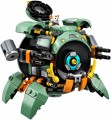Age
Age recommendations are quite conditional, but it is still not recommended to deviate from them. So construction toys for older children may contain small parts that a curious little child might swallow. At the same time, sets for little ones are easy to assemble and uninteresting for adult children. And an age-inappropriate construction set may turn out to be too complex and inconvenient, upsetting or even frightening the baby.
Note that the age category to some extent characterizes the maximum age at which the designer can be useful. For example, a set for
1+ and
2+ is unlikely to attract
an 8-year-old or even a
7-year-old primary school student, while a complex design
for 14+,
16+ and even
18+ often turns out to be interesting even for adults over 30 and even over 40. However, even within the same age category, much depends on the characteristics of a particular set, in particular, on the type of game. And there are design options for any age. In addition to those listed above, there are also
3+,
4+,
5+,
6+,
9+,
10+,
11+,
12+.
Number of pieces
The total number of parts included in the delivery of the designer. At the same time, the calculation, usually, also takes into account the details that make up individual characters (torso, arms, legs, head, etc.) — despite the fact that the figures are most often delivered assembled and are not designed for disassembly during normal use . Also note that the kit may include several spare parts, in case of breakage or loss of any of the main elements.
Number of characters
The number of characters included in the delivery kit of the designer. In this case, a character means a figure of a person or a humanoid creature (for example, an alien or a robot). Animals do not formally belong to the characters, therefore they are indicated separately, in the notes to this paragraph; the exceptions are anthropomorphic (humanoid) figurines, which differ from people only in facial features, the presence of claws and tails, etc. Also note that this category does not include creatures whose assembly is the main purpose of the constructor. For example, if the constructor is designed to assemble a humanoid robot, and the mechanic of the robot is made in the form of a separate figure, then only the mechanic will be considered a character.
Moving elements (mechanics)
Details and elements that, after assembling the designer, can move, but are not driven by a motor; in other words, moving parts that need to be moved manually. These can be, for example, windows and doors, hatches, screws, crane booms, etc. The exception is rotating wheels — in this case they are not considered moving elements.
Mechanical moving elements can be combined with motorized ones (see below).

